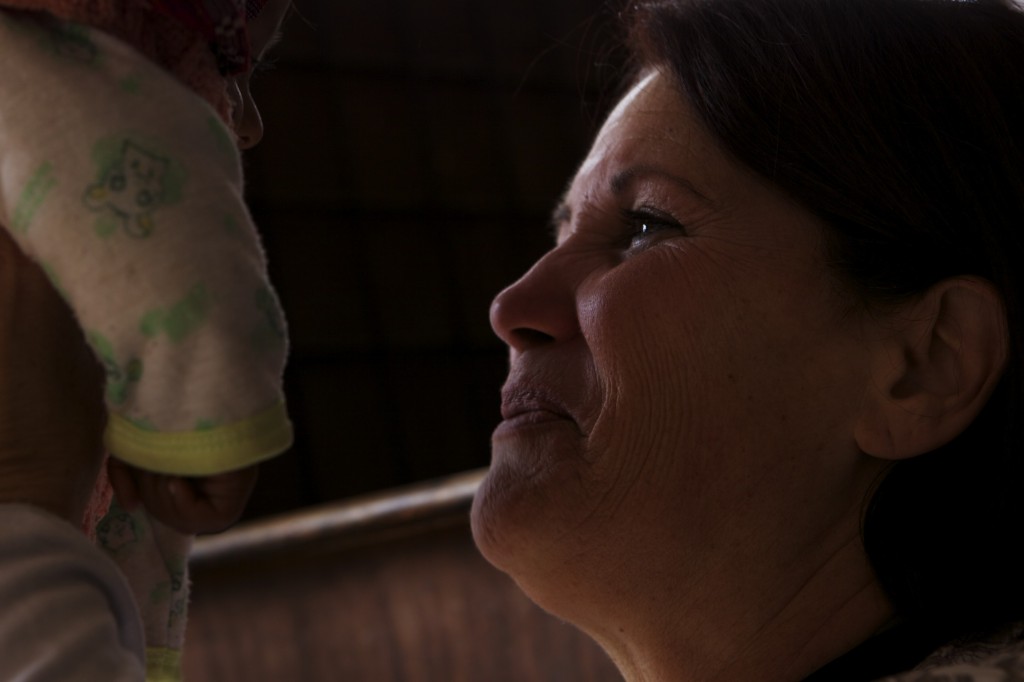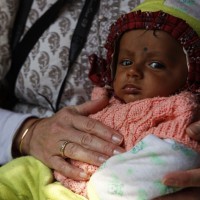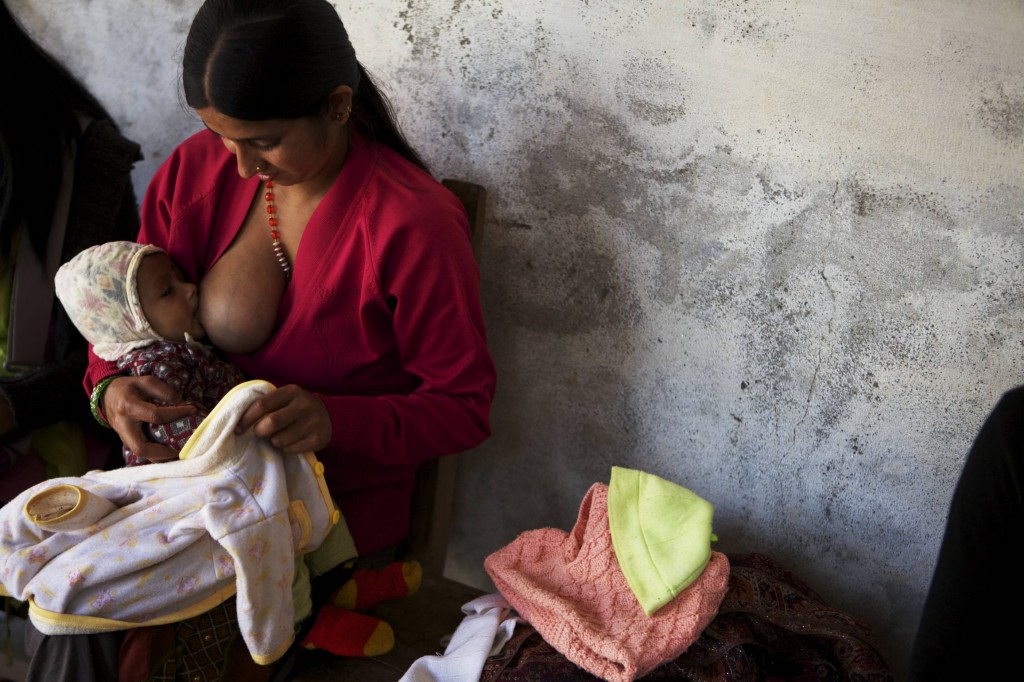On The Path of Service, All Doors Will Open
The Story of Arlene Samens and One Heart World-Wide. Her soft hands cradle a plump baby girl slouched across her lap. She uses those long delicate fingers to lift the bright pink knitted sweater the small child is wearing in order to slowly palpitate the baby’s stomach. The whiteness of her hand resting on child’s dark chocolate brown skin is the only indication that the child is not her own, as she effortlessly calms the sickly baby. Arlene Samens asks Sunita, the young nurse at her side, to ask the mother a series of questions. Her voice is smooth, with only the slightest twinge of concern. The medical questions roll off her tongue easily as she lifts the child in play. The bright light streaming through the open doorway lights up her joyful face. Her dark brown bob bounces up and down in her delight, while the smile lines surrounding her eyes and mouth ooze with kindness.
Her soft hands cradle a plump baby girl slouched across her lap. She uses those long delicate fingers to lift the bright pink knitted sweater the small child is wearing in order to slowly palpitate the baby’s stomach. The whiteness of her hand resting on child’s dark chocolate brown skin is the only indication that the child is not her own, as she effortlessly calms the sickly baby. Arlene Samens asks Sunita, the young nurse at her side, to ask the mother a series of questions. Her voice is smooth, with only the slightest twinge of concern. The medical questions roll off her tongue easily as she lifts the child in play. The bright light streaming through the open doorway lights up her joyful face. Her dark brown bob bounces up and down in her delight, while the smile lines surrounding her eyes and mouth ooze with kindness.
Sunita has finished questioning the baby’s worried mother, and breaks down the symptoms to Arlene with the systematic ease of most medical personnel. Arlene returned the child to her mother’s arms, and asked the young woman to come with her to the hospital tomorrow to have some tests run—her American drawl coming out as she adds, “just in case.” Although she is half way around the world from her own home overlooking the Golden Gate Bridge, Arlene looks at home in the small clinic sparsely furnished on the edge of a plateau high in the foothills of the Himalayas.
The series of events that brought Arlene to this small health post in the small village of Narayansthan in Western Nepal, spans three countries and nearly 15 years. It starts in 1997 when Arlene went to India to meet His Holiness the Dalai Lama with Interplast, a non-profit that worked in developing countries providing surgery for children with cleft lips and palettes. “I took a team of doctors there and we had the privilege to have a private audience with His Holiness, at that time he told me to go help the women and children in Tibet.” She had no idea how to get into Tibet and asked his Holiness what to do.
He said simply: “On the path of service, all doors will open.” She smiles; “I have found that to be very true.”
“I had no idea that he really meant it, but a few months later I was called back to India and met with the Minister of Health for the exile government.” Arlene was introduced to a Tibetian doctor who helped organize an invitation for Interplast, to come work at a local hospital to repair cleft lips. She recalls visiting Lhasa in 1998, “I was astonished to see the birthing conditions in which women were giving birth, and the reality hit me for the first time how many women were dying in the developing world.” At that time one in ten newborns would die in Tibet, and it is one of the few cultures in the world to have no tradition of birth attendants. From this initial mission, Arlene worked with a compassionate Chinese doctor to organize for more doctors to visit. “We started out as a very small team of doctors and nurses from the University of Utah who went once a year for two weeks.” In 2004 Arlene received a NIH grant that would allow her to leave her 31-year career as a nurse practitioner in maternal fetal medicine at the University of Utah School of Medicine to start a fulltime project.
Since then, Arlene has worked as the founder and CEO of One Hear World-Wide, a non-profit organization dedicated to, “to serving pregnant women living in the most vulnerable conditions.” In Tibet, One Heart initially tried to train highly skilled midwives. “But we soon discovered that was not enough, as many villages did not have a midwife, and it would take us time to train one.” So One Heart began training the community health workers, known as the Women’s Federation, “to go out and visit every single pregnant woman.” They would make sure each mother received 4 prenatal visits, knew what to do in case of an emergency, had a delivery plan and a clean birth kit. But still this was not enough.
“This is when I gave birth to the Network of Safety,” Arlene explains, “The network ensures that every woman is given a safe clean delivery by teaching the family, the community, all the health providers, and the local government to work together so that she does not fall through the cracks.” Arlene uses this model to work towards their goal “to have no maternal deaths in the communities where we worked.” One Heart trained over 400 midwives and 1500 community health volunteers in Tibet, who she calls their “footsoldiers.” Arlene says with a smile, “In the two provinces we worked in there were no maternal deaths.”
Arlene would not only change the lives of thousands of women, but three little girls would become apart of her family.
“One day I was taking a lunch break and took a walk, on the street was a beautiful young girl with a small-dehydrated dirty baby in a box.” The small child was obviously malnourished and in need of care. Arlene asked the girl if she knew who the mother of the baby was. The young girl told Arlene, “her family found that baby in the garbage and kept him.” Arlene thought to herself, “I cannot just leave them on the streets.” She returned to her office to get one of her staff to help translate for her.
When Arlene came back she found that the mother and two more girls had come. Arlene asked them all to come back to her hotel where she feed them and began to inquire how they ended up on the streets. She found out they were poor farmers from another area who had come to Lhasa to beg because they could not make a living. “The father was an alcoholic and did not work and basically the girls’ begging was their livelihood.” Arlene made a commitment that day, “that those girls would never go back to the streets to beg again.” She would find a school to accept them along with two friends to help sponsor them. “Together over the past ten years we have kept the girls in school and the oldest is now living in a boarding school near Shanghai China and doing really well.”
Her three girls would be on her mind on the morning of March 14 2008.“I woke up that morning to find out I had been nominated as a CNN Hero, and found myself embroiled in a political uprising in the afternoon.” Her eyes tear over, “I will never forget that day, as long as I live.” She recalls, “The streets broke out in flames as cars and buildings were set on fire and storefronts were smashed. I witnessed gunfire, tear gas, rioting, and chaos all around me.” Arlene found safety in hotel nearby. “I was so worried about my three girls as we were suppose to stay the weekend together, the feeling of deep anguish still haunts me today.”
The next day, Arlene forced the police to take her to the office where another Doctor and her friend Pema were stranded. They would spend the day hiding from the chaos outside. Knowing she needed to retrieve her passport from her apartment, the following day Arlene and Pema would brave the streets. They had been told they were not allowed outside as the streets were on fire and there was Marshall law. She asked the soldiers “if we could please go get my passport and belongings so that I could leave.” They said, “ok go, but we will not protect you.” They winded along the abandoned cobblestone streets.
As they neared Arlene’s apartment they caught a solider off guard. “He pointed his gun at us and I told Pema to stand behind me. I thought he might shoot her but probably not me.” Arlene’s mind suddenly clear. “In that moment I realized they could not hurt me, if he shot me and I died then that was ok, if he shot me and injured me, that was ok too.”
Making there way past the soldier they retrieved Arlene’s belongings and returned to the office, where they were told they had to leave. They were in the middle of a firestorm. The owner of the hotel gave them his van. “We pulled out into the street where the soldiers were dragging Tibetans in chains and beating them in front of us.” The next day Arlene would make it to the airport and out of the city. “I was totally broken inside thinking of leaving my staff not knowing what would happen to them.” For a long time Arlene would have nightmares about this, “I would wake up screaming trying to get help.” Back in the United States Arlene would seek help from a therapist, who treated her for posttraumatic stress.
In 2009 the Dali Lamas’ exile community would change Arlene’s life once again when she meet Ziggy, her future husband. They meet in India at the home of the Dalai Lama. She recalls, “We fell in love when he came to see me in the US one month later.” Ziggy would join her when she returned to Tiber in the summer of 2009. “He knew we might have to close the office and wanted to be there for me.” When Arlene did have to close the office Ziggy encouraged her to never give up. Arlene says, “He always tells me that this is my life’s work and it is important to believe in my dream.” Ziggy would ask Arlene to marry him while they were together in Lhasa. Arlene has not seen her three girls since April 2010. “The Chinese do not allow me to go back to Tibet,” Arlene explains. Adding, “I do skype the girls as often as I can. I miss them so much.” She is going to try to see them this August.
Arlene and her team took the lessons they learned in Tibet and carried them to two new projects in Nepal and Mexico. Arlene says, “I have quit a thousand times and often give myself permission to quit for that day.” Unwilling to walk away Arlene continues to do this work, “for the women who do not have a voice and die in childbirth.” Which is why on a cool afternoon in February 2011, Arlene herself continues to delivered safe nutritional information to a young mother worried about an unsettled child unable to keep down food in a small clinic overlooking the deep valleys renowned in Western Nepal.
The next day she asked a room full of local doctors and politicians to raise their hand, “if you have a daughter, a sister, a wife, or a mother.” Slowly every hand was raised. She continued, her own hand still firmly in the air, “world-wide every minute, one woman and eight babies will die during childbirth. I believe this is unacceptable.”

